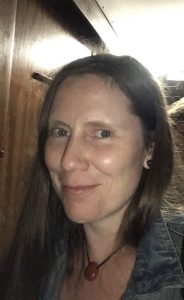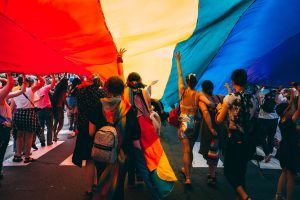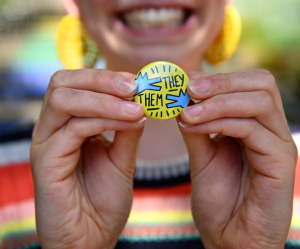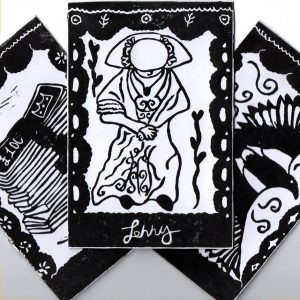Today’s blog is the last of the week of LGBTQ+ research focussed articles and is a special edition to celebrate Autistic Pride Day which takes place tomorrow, 18 June 2022. In it, we are featuring Jo Clough who is a PhD student looking at the experience of autistic women accessing social care. Although we particularly wanted to showcase her work for Autistic Pride Day, Jo explains why her work is also relevant to the LGBTQ+ community in general.
What is the research project you are currently working on?
 I did a master’s in social work at Bristol University and I guess my dissertation and work as a student social worker inspired me to do what I’m doing now. Alongside this, the project also stems from personal and professional experiences of male bias and seeing how this plays out time and time again in research, practice and day-to-day life.
I did a master’s in social work at Bristol University and I guess my dissertation and work as a student social worker inspired me to do what I’m doing now. Alongside this, the project also stems from personal and professional experiences of male bias and seeing how this plays out time and time again in research, practice and day-to-day life.
I’m looking to interview autistic women and that’s anyone who identifies as a woman or basically non-male – so non-binary, trans, anyone who doesn’t exclusively identify as male!
It’s to do with their experiences of adult social care, so whether people have had support from social care or whether they’ve tried to access it. I’ll be doing semi-structured interviews and I’m offering a variety of different formats to try and capture as many voices as possible because there’s a large number of people that quite like typing, for example, rather than just your traditional face-to-face talking interview.
How is this relevant to the LGBTQ+ community?
I’m coming from an intersectional lens, so I’m interested in how all different kinds of marginalised groups are impacted. For instance, a black gay autistic woman is very likely to have different experiences compared to a white, heterosexual autistic guy. I’m looking at how these characteristics and social identities overlap and can pose as barriers to accessing services and support. At times these can be subtle barriers that it’s not always easy for people to see.
More specifically to the LGBTQ+ community, current research shows that there are higher rates of ‘non-heterosexuality’ in the autistic population and then, even more specifically, it’s higher in autistic women than it is in non-autistic women. So it’s very pertinent to the community, and going on from that, gender diversity is higher again in autistic populations compared to neurotypical populations, so it is very relevant to the community.
Is the motivation for your research more to raise awareness or do you have a specific goal of increasing support for these people in some way?
 It’s quite a few things really. Even though there is research that might talk about autistic women or autistic people, it might not even report on sexuality or race. If you just talk about the LGBTQ+ community specifically, research shows that mental health outcomes are poorer, and then you throw autism into the mix and it’s even poorer again. So yes, it would be great to raise awareness, not just about getting support, but knowing that the support is there. The funny thing is that although there’s all this medicalised talk going around with autism, the way you get a diagnosis is through behaviour. So it’s a very socially diagnosed label and a lot of people don’t realise they’re entitled to social care support.
It’s quite a few things really. Even though there is research that might talk about autistic women or autistic people, it might not even report on sexuality or race. If you just talk about the LGBTQ+ community specifically, research shows that mental health outcomes are poorer, and then you throw autism into the mix and it’s even poorer again. So yes, it would be great to raise awareness, not just about getting support, but knowing that the support is there. The funny thing is that although there’s all this medicalised talk going around with autism, the way you get a diagnosis is through behaviour. So it’s a very socially diagnosed label and a lot of people don’t realise they’re entitled to social care support.
What do you think is the biggest challenge of getting to hear those voices?
There’s all kinds of reasons I think. I’ve found going out and putting up paper posters in the community more difficult than I expected – people almost treat me like I’m a big company looking for free advertising! We’re living in COVID times – charities are stretched, some are stressed. And because I’m trying to get a variety of voices and do something a little bit different to what’s out there already I haven’t gone through standard routes, like contacting the National Autistic Society for example. So far I have found online methods to be the best, which makes sense when, as I said, there is a preference for online forms of communication, because obviously, you can have your video off, you can type, and also have that processing time which is really valuable in a world where that is not really the norm yet.
Will you be celebrating Pride yourself?

Yes, I will be going to the parade but also to Bitch, Please! which is an afterparty in the courtyard of the Christmas Steps. They have some great local DJs and the profits go to the Albert Kennedy Trust, which is an LGBTQ+ youth homelessness charity, and to the All Out Ukrainian LGBTQIA+ fund. So it will be great fun but all in a good cause as well!
A big thank you to Jo for giving up her time to talk to us. If you would be interested in taking part in her research you can contact her directly at j.clough@brtistol.ac.uk. And if you would like to know more about how we are celebrating Pride please visit our Pride webpage. And if you have your own stories to share about Pride or being part of the LGBTQ+ community please get in touch: student-comms@bristol.ac.uk.
#BristolUniPride #BristolPride


 I started my PhD in a different area of research, looking at alternative economies. I think it was something like 2012, 2013, and I just came across RuPaul’s Drag Race. I got hooked to the point that I nearly stopped finishing my PhD! I watched all the series that were out there, and I kept watching it again and again and again!
I started my PhD in a different area of research, looking at alternative economies. I think it was something like 2012, 2013, and I just came across RuPaul’s Drag Race. I got hooked to the point that I nearly stopped finishing my PhD! I watched all the series that were out there, and I kept watching it again and again and again! I am an advocate of Pride as a protest, I think that’s the function of Pride, rather than having a parade of corporate sponsorships. Effectively, as they became a brand, they also become more commercialized. I think Pride is a bit of a crossroad in terms of what it represents. Pride really has to reconfigure what they stand for.
I am an advocate of Pride as a protest, I think that’s the function of Pride, rather than having a parade of corporate sponsorships. Effectively, as they became a brand, they also become more commercialized. I think Pride is a bit of a crossroad in terms of what it represents. Pride really has to reconfigure what they stand for.  Yes, there are the very young people! Though we don’t yet have many of them in our research interviews. We have people more or less my age, that went through being in the closet when they were younger, that hardship there. And we’ve interviewed older people, who have been through the same thing, but they’re also really attracted to this fabulousness of drag queens!
Yes, there are the very young people! Though we don’t yet have many of them in our research interviews. We have people more or less my age, that went through being in the closet when they were younger, that hardship there. And we’ve interviewed older people, who have been through the same thing, but they’re also really attracted to this fabulousness of drag queens!
 I think that, within academia, there is a real appetite for understanding how laws, social structures and cultural practices negatively impact the lives of LGBTI+ populations. In recent times, the UK, particularly our different funding bodies, has been good in terms of providing resources for LGBTI+-focused research, and in encouraging and creating relevant conversations within academic spaces. At present, there are numerous academics across the UK who are undertaking really important studies into the lives and experiences of LGBTI+ communities.
I think that, within academia, there is a real appetite for understanding how laws, social structures and cultural practices negatively impact the lives of LGBTI+ populations. In recent times, the UK, particularly our different funding bodies, has been good in terms of providing resources for LGBTI+-focused research, and in encouraging and creating relevant conversations within academic spaces. At present, there are numerous academics across the UK who are undertaking really important studies into the lives and experiences of LGBTI+ communities.
 In the first of this week’s blogs focusing on research we are talking to the vibrant Dr Sarah Jones, a lecturer and researcher in the Department of History. Dr Jones’ teaching in
In the first of this week’s blogs focusing on research we are talking to the vibrant Dr Sarah Jones, a lecturer and researcher in the Department of History. Dr Jones’ teaching in  The big motivation behind the Jenny project is the fact that queer histories, and especially trans histories, are often told through what we would consider regulatory bodies, so we tend to hear about people when they’re arrested, or oppressed in some way, or when horrible things are happening to them. And that’s obviously a really important thing to look at and understand, but it also means that you don’t really get that much of a sense of these people as real, living people. History has often tended to focus on victimisation, oppression, and persecution – what Tom (Marshman) wanted to do is think about different ways we could look at the archive and build a more rounded, human story about someone like Jenny. Just a wonderfully complicated person living a complicated life in a complicated moment.
The big motivation behind the Jenny project is the fact that queer histories, and especially trans histories, are often told through what we would consider regulatory bodies, so we tend to hear about people when they’re arrested, or oppressed in some way, or when horrible things are happening to them. And that’s obviously a really important thing to look at and understand, but it also means that you don’t really get that much of a sense of these people as real, living people. History has often tended to focus on victimisation, oppression, and persecution – what Tom (Marshman) wanted to do is think about different ways we could look at the archive and build a more rounded, human story about someone like Jenny. Just a wonderfully complicated person living a complicated life in a complicated moment. 


